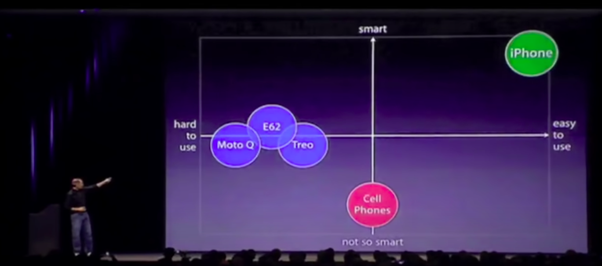How Do You Position Your Product Versus The Competition?

I’ve been watching a lot of Steve Jobs product launches for a project I’m working on. Jobs communication skills are beyond good. They are also utterly simple to copy.
[Do you want to grow your business? Maybe I can help. Click here.]
In every single product launch, Jobs follows a predictable script. It’s the same script I’d suggest you follow too.
Jobs calls it, “Business School 101.” I call it perceptual mapping which I did learn in graduate school, so maybe Jobs is right.
Here’s how it works:
A. You determine the two most important characteristics of the product or service you are selling.
What you’re looking for is how you can be unique in a meaningful way to your prospective customers. This could be price, speed, power, quality, ease of use.
The list of possibilities is endless.
B. You make sure your position in the market is unique versus your competition.
Watch at any Jobs product intro, and you’ll notice that Apple always owned a unique position in the market. Every. Single. Time. You’ll see the Apple product was defined as unique.
Yes, this may be business school 101, but it’s critical to positioning your product versus your competition.
For example, the two metrics Jobs choose to define the iPhone were smart/not so smart versus easy to use/hard to use. Look at what Jobs was able to do with this business school 101 tool.
The iPhone, Apple’s product, is positioned completely differently, and much better, than all the competition. If you wanted a smart phone that was easy to use in 2007, you had no choice but the iPhone.
C. You can control how you define the competition with perceptual maps.
Great marketers understand that there are no rules to how you compare yourself to your competitors. You are in complete control of the story.
You can choose whatever way you want. The industry standards that Apple was attempting to replace were the Motorola’s Moto Q, Nokia’s E62, and the Palm Treo. Jobs put them in a box as hard to use and not so smart.
Who wants to use a phone like that?
D. Just remember that your choice of characteristics has to be important to your customers.
Yes, you can pick whatever characteristics you want, but your prospective customers actually have to care about the characteristics you choose.
For example, if you think speed and power are important, but your customers don’t, then your product or service is going to fail.
E. Finally, your product or service actually has to be good.
Jobs was a great marketer. There’s no doubt about it. That’s was obviously a key to Jobs success.
Maybe more important than Jobs skill as a marketer was he had great stuff to sell. In other words, you can’t fake it. If your product isn’t any good, then no matter how good your product positioning is, your product is still going to fail.